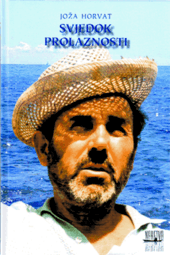Joža Horvat
| Joža Horvat | |
|---|---|
|
Horvat's portrait on the cover of Svjedok prolaznosti | |
| Born |
Josip Horvat 10 March 1915 Kotoriba, Austria-Hungary |
| Died |
26 October 2012 (aged 97) Zagreb, Croatia |
| Pen name | Joža |
| Occupation | Writer |
| Period | 1935 |
| Genre | novele |
| Notable works |
Ciguli Miguli (1952) Mačak pod šljemom (1962) Besa–brodski dnevnik (1973) Operacija "Stonoga" (1982) Waitapu (1984) Svjedok prolaznosti (2005) |
| Notable awards | Vladimir Nazor Award for lifetime achievement in literature |
| Spouse | Renata Horvat (neé Jesensky)[1] |
| Children |
Radovan–Mićo (d. 1973) Marko (d. 1975)[2] |
Josip "Joža" Horvat (10 March 1915 – 26 October 2012) was a Croatian writer. He was the author of many novels, short stories, dramas, screenplays, essays and radio dramas, translated into at least nine languages, including Russian, Chinese and Esperanto.[3]
Life and career

Horvat was born in Kotor, Zala County, at the time in Hungary. During World War II he fought in Yugoslav Partisans, which later inspired the novel Mačak pod šljemom (Tomcat under a Helmet, 1962) which had a somewhat ironical view of the partisan movement, adapted both into a feature film and a miniseries. The screenplay Ciguli Miguli (1952), critical of bureaucracy, briefly brought him into disfavour with the Communist party authorities, on which occasion he turned to sailing.
In mid-1960s Horvat and his family sailed the world in the sailing yacht Besa, and his travel journal Besa–brodski dnevnik (Besa–Ship's Log, 1973) became a best-seller. The second trip around the world was marked by tragedy: Horvat’s older son, who stayed back, died in a traffic accident in 1973, and his younger son drowned in Venezuela in 1975.
After a period of deep crisis Horvat published two acclaimed novels inspired by these events, Operacija "Stonoga" (Operation "Centipede", 1982), about a search for a lost island in the Atlantic, and Waitapu (1984), about a Pacific Islander boy who decides to sail across a taboo line. His last work is a memoir titled Svjedok prolaznosti (A Witness to Impermanence, 2005).[3][4][5][6]
Horvat attended the Faculty of Philosophy in Zagreb and served as a secretary of Matica hrvatska.[3]
References
- ↑ "Mačak iz autobiografije" [Tomcat of Autobiography] (in Croatian). Matica hrvatska. 2005. Retrieved 26 October 2012.
- ↑ "Bolne uspomene našeg Vasca da Game" [Painful Memories of Our Vasco da Gama] (in Croatian). Jutarnji.hr. 2005. Retrieved 26 October 2012.
- 1 2 3 "Horvat Joža" (in Croatian). Croatian Writers Society. Retrieved 7 December 2011.
- ↑ "Promoviran roman "Svjetionik" autora Jože Horvata" [Presentation of the Novel "Svjetionik" by Joža Horvat] (in Croatian). 2000. Retrieved 7 December 2011.
- ↑ "Joža Horvat u Kotoribi" [Joža Horvat in Kotoriba] (in Croatian). 2004. Retrieved 7 December 2011.
- ↑ "Navtični Portret: Doživeti Barbo Jožo Horvata" [Nautical Portrait: To Experience Old Man Joža Horvat] (in Slovenian). Revija Kapital. Retrieved 7 December 2011.
